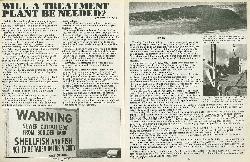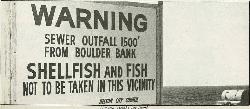32
Will A Treatment Plant Be Needed?
By The Editor
Pollution is a word much bandied about in recent times. "Water pollution," "air pollution," "soil pollution." Few people would not have heard those terms, and perhaps many are becoming sick of hearing them. But the more they are used, the more others will be aware of pollution.
Fortunately Nelson is relatively free from pollution. Relatively free, but not entirely. Wherever there is industry, or indeed wherever there are people in mass, there will be a degree of pollution.
Awareness is contributing to greater controls of pollutants entering the natural environment than before. What would have been accepted as a satisfactory arrangement 10 years ago, is no longer.
A Nelson example of this is the disposal of the city city's sewage. Until a few years ago the excrement of the city's population flowed into the boat harbour and out into Tasman Bay, through The Cut or, as did happen occasionally, it passed between Haula-shore Island and Rocks Road, on its way to Tahuna Beach. Not very pleasant.
At low tide, the raw sewage poured onto exposed mudflats. And there it lay until the incoming tide collected it.
This crude method of disposal existed until about two years ago, when the Nelson City Council's sewerage outfall from the Boulder Bank began operating.
The decision to re-route sewage so it passed through four comminutors, which "chewed up" the matter so it reached the outfall in a milky liquid state, is to be commended.
But why not add a treatment plant to the system so that a purer liquid flows into Tasman Bay?
Expense is one factor. The sewerage system will cost about one million dollars and the addition of a treatment plant would entail another major capital outlay.
And at what stage is water polluted? When is it necessary to treat sewage before it enters that giant sumphole — the sea?
The sewage flows into Tasman Bay, north of the city, and with a north easterly drift carrying it away, the area of polluted water would probably not affect many people. That is the reasoning behind siting the outfall. Also thorough tests were made of the seabed in the vicinity of the outfall, prior to its construction, and these revealed no significant quantities of shellfish.
It appeared the only people who would be affected were weekend fishermen, private shellfish divers, the handful of surfers who frequent one of Nelson's best surf spots, Snapper Point, which is just north of the outfall, and perhaps the occasional boatie, cruising in the immediate area.
However, local fishermen are preparing a case suggesting that a valuable export industry is threatened.
Recently the Nelson Catchment Board recommended that the Marine Department prohibit shell fishing in a 12sq. mile area off the Boulder Bank. A small portion of a recognised shellfishing bed cuts through one corner of this area and, seemingly, com-merical fishermen won't be seriously affected.
Not so, claim the fishermen. The 31 boats operating from Nelson and Golden Bay normally work off the Boulder Bank in easterly conditions when a deal of protection is afforded by the bank. By closing a large area, the available working space is limited. And fishermen say there are more shellfish — oysters, scallops and mussels — in the affected area than realised. And having a polluted area near established grounds could prejudice the marketing of shellfish taken from those legal grounds.
The sign speaks for itselt




